List of monastic houses in County Galway
Overview
In this article smaller establishments such as cells and notable monastic granges (particularly those with resident monks) and camerae of the military orders of monks (Templars and Hospitallers) are included. The numerous monastic hospitals per se are not included here unless at some time the foundation had, or was purported to have, the status or function of an abbey, priory, friary or preceptory/commandery.
Article layout
Communities/provenance: shows the status and communities existing at each establishment, together with such dates as have been established as well as the fate of the establishment after dissolution, and the current status of the site.
Formal Name or Dedication: shows the formal name of the establishment or the person in whose name the church is dedicated, where known.
Alternative Names: some of the establishments have had alternative names over the course of time. In order to assist in text-searching such alternatives in name or spelling have been provided.
Monastic Glossary: following the listing, provides links to articles on the particular monastic orders as well as other terms which appear in the listing.
Abbreviations and Key
Locations with names in italics indicate probable duplication (misidentification with another location) |
|
Alphabetical listing of establishments
| Foundation | Image | Communities & Provenance | Formal Name or Dedication & Alternative Names | OnLine References & Location |
|---|---|---|---|---|
| Abbeygormacan Abbey | Augustinian Canons Regular founded before 1170?; dissolved 1543; granted to Ulick Bourke (William Ulick de Burgo Mac William), first Earl of Clanrickard (Clanricarde) 1543/1544, who probably did not evict the canons, who possibly remained until the reign of Elizabeth I |
The Abbey Church of the Blessed Virgin Mary, Gormacan ____________________ Gormacan Abbey; Abbey Gormogan Abbey; Monaster O Gormogan; de Via Nova; Nova Via | [1][2] 53°12′52″N 8°20′57″W / 53.214411°N 8.349223°W | |
| Addergoole Abbey (Addergoole parish, near Ardcloon) |
order, period and foundation unknown "Abbey (in ruins)"[notes 1] |
53°37′14″N 8°49′29″W / 53.620514°N 8.824639°W | ||
| Ahascragh Abbey | early monastic site, reputedly founded by St Cuan; C.I. church on site |
Ahaskeragh; Ath-ascrath; Ath-ascrach; Ath-escrach-Cuain | [3][4][5] 53°23′53″N 8°20′06″W / 53.398168°N 8.334933°W | |
| Annaghdown Abbey of St. John the Baptist |  |
Premonstratensian Canons daughter of Tuam; founded before 1224; raised to abbey status c.1236; dissolved after 1542?; apparently the abbey was the most northerly of the ruins (known as 'the Nunnery') at Annaghdown; dissolved 1562; granted to Richard, Earl of Clanricarde 1572; granted to the warden and vicars of King's College, Galway 8 July 1578 |
St John the Baptist de Cella Parva | 53°23′18″N 9°04′19″W / 53.388342°N 9.071885°W |
| Annaghdown Abbey of St Mary |  |
Augustinian Canons and Canonesses Regular — Arroasian founded after c.1140, possibly by Turlough O'Conor at the instance of St Malachy; identification sometimes confused with the Premonstratensian foundation to the north; dissolved before 1578, granted to Richard, Earl of Clanricarde 1562 |
The Abbey of Saint Mary de Portu Patrum, Annaghdown | 53°23′13″N 9°04′22″W / 53.386908°N 9.072736°W |
| Annaghdown Cathedral & Nunnery |  |
early monastic site, Gaelic nuns founded 6th (before 578) century by St Brendan for his sister Briga, site traditionally granted by the King of Connacht; Augustinian nuns — Arroaisian adopted after 1144; priory, dependent on Clonard; integrated into the Abbey of St Mary de Portu Patrum c.1144; episcopal diocesan cathedral before 1189 (and after 1152); church of St Mary Evachdun, cum villa Kelgel confirmed to the Arroaisians of Clonard 1195; dependent on Kilcreevannty from before 1223, church of St Mary Eanchduyn confirmed to the Arroasians of Kilcreevanty c.1123 and 1400; diocese united with Tuam 1327; canons and canonesses possibly shared the same church; dissolved after 1223-4, nuns possibly transferred to Inishmaine |
Monastery of Lough Corrib; Annadown; Eanach-duine; Enaghcoin; Evachdun; Lough Corrib; Lough Orbsen | 53°23′16″N 9°04′16″W / 53.387721°N 9.071215°W |
| Annaghdown Friary | erroneously listed as Franciscan Friars[notes 2] | |||
| Ardnabara Abbey in Killimordaly parish |
possible monastic site — order, foundation and period unknown, "Ardnabara Abbey, in ruins"[notes 3] | 53°19′18″N 8°34′45″W / 53.321697°N 8.579078°W (approx) | ||
| Ardrahan Monastery | early monastic site; stump of round tower[notes 4] |
Ard-rathain | 53°09′28″N 8°48′25″W / 53.157718°N 8.806990°W | |
| Athenry Priory |  |
Dominican Friars founded 1241; dissolved 1574; granted to the town; reoccupied 1595; Regular Observant date unknown; dissolved c.1597, burned with the town during hostilities; friars granted a new site at Coilascail, infra; became a university 1644; site recovered by friars 1685, retained until the general exile 1698; used as a barracks 18th century; (NM) |
The Priory Church of Saint Peter and Saint Paul ____________________ Ath-na-riogh; Ath-na-rig; Anry | 53°17′54″N 8°44′40″W / 53.2982229°N 8.7444514°W |
| Athenry Friary ≈ | erroneous reference to Franciscan Friars — mistaken identification of Adare Friary[notes 5] | |||
| Aughrim Priory | early monastic site, founded before 741; Augustinian Canons Regular - (?)Arroasian founded before 1170? or 1220, doubtfully purportedy by a Butler (Theobald Walter, first Butler of Ireland[notes 6]), more likely by an O'Kelly, with a Butler as a later benefactor; burned 1307; dissolved c.1562?; granted to Richard, Earl of Clanricard; Augustinian Friars |
St Catherine ____________________ Eachdruim; Acharym-Omane; Aghrim; Achdrum; Echraim Enachdruim-Omane | 53°18′14″N 8°19′04″W / 53.303964°N 8.317761°W | |
| Ballynahinch Friary | Carmelite Friars founded 1356 by O'Flaherty; dissolved during the reign of Elizabeth I; convent listed as re-established c.1737[notes 7] |
Baile-na-hinse; Ballinhinceh; Dalcaccense? | 53°27′43″N 9°52′05″W / 53.461890°N 9.868126°W (approx) | |
| Ballynakill 'Abbey' | "Abbey",[notes 8] "Ellomaine Graveyard"[notes 9] | Ellomaine | ||
| Beagh Friary (Barony of Clare) | Franciscan Friars, Third Order Regular founded after 1441; dissolved before 1585; granted to John Newton |
53°31′06″N 9°00′32″W / 53.518270°N 9.008971°W (approx) | ||
| Beagh Friary (Barony of Kiltartan) ≈ | Franciscan Friars, Third Order Regular — erroneous reference to the friary in the Barony of Clare (see immediately above) | |||
| Boilean Clair | Franciscan Friars Minor, Conventual — actually Claregalway — erronesously identified as a separate foundation[notes 10] | |||
| Boley Friary | Dominican Friars — from Portumna apparently founded early 18th century |
Boula; Buaile | 53°08′05″N 8°43′06″W / 53.134826°N 8.718252°W (approx) | |
| Caheradreen Monastery | early monastic site | 53°14′48″N 8°54′02″W / 53.246805°N 8.900535°W (approx) | ||
| Caltra Friary | 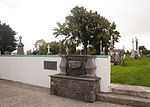 |
Carmelite Friars founded not later than 1336 (c.1320) by the Berminghams, barons of Athenry; dissolved 1589; granted to John Rawson 1589; restored 1735 (c.1737); closed c.1775 |
Kaltragh-ne-Pallice Caltragh Pallas; Caltranapallice; Caltra-ne-Pallas; Callarense; Kaltragh-; Keal-; Pallice; Paileeshe | 53°14′48″N 8°54′02″W / 53.246805°N 8.900535°W |
| Claregalway Friary |  |
Franciscan Friars Minor, Conventual founded before c.1252 by John de Colgan I;<ref group="notes" name="ClaregalwayFriary1>not John de Colgan II as suggested by Ware and others</ref> dissolved 1542; granted to Richard de Burgo 1570; friars remained Observant Franciscan Friars adopted 1567?; dissolved c.1589, friars expelled by Sir Richard Bingham, who converted the buildings into barracks; friars permitted use of part of the monastery until expelled again; friars attempted to restore monastery after 1641; chapel in use until 18th century; (NM) |
Claregalway Abbey; Clair; Baile-an-chlair; Boilean-Clair; Clar-dun-dunul | 53°20′48″N 8°56′41″W / 53.3468019°N 8.9446397°W |
| Cloghmore Monastery | early monastic site, founded 6th century by St Colmcille | Cloch-mor, in Killannin parish | 53°13′43″N 9°31′26″W / 53.228723°N 9.523880°W (approx) | |
| Clonfert Abbey | Augustinian Canons Regular — Arroasian founded after 1140, possibly by Turlogh O'Conor, at the instance of St Malachy; dissolved 1571 |
St Mary's de Porto Puro | 53°14′24″N 8°03′28″W / 53.240134°N 8.057667°W | |
| Clonfert Monastery | Gaelic monks founded before 577 or 583 by St Brendan the Navigator; episcopal diocesan cathedral 1111 |
Cluain-ferta-brenaind; Cluain-ferden | 53°14′27″N 8°03′30″W / 53.2406959°N 8.0584259°W | |
| Clonfert, Monygayun Abbey | Augustinian nuns — Arroasian founded after 1144; dependent on Kilcreevanty from before 1223; dissolved during the reign of Elizabeth I |
St Mary | ||
| Clonkeenkerrill Friary | 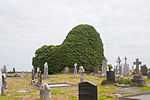 |
Franciscan Friars, Third Order Regular founded c.1435 by Thomas O'Kelly, Bishop of Clonfert, converting the church into a friary at the instance of David and John Mullkerrill; Franciscan Friars Minor, Conventual refounded 1453, papal permission obtained by David Mullkerrill |
Cloonkeenkerrill; 'St. Kerrill's Abbey' | 53°22′59″N 8°34′51″W / 53.3831236°N 8.5808372°W |
| Clonkeenkerrill Monastery | early monastic site | Cluain-cain-cairill; Cluain-caoin-cairiolla; Cluacaen-Caeryll | ||
| Clontuskert Priory | early monastic site, founded c.805 (before 809), by St Boedan; Augustinian Canons Regular - Arroasian founded after 1140, probably by the O'Kelly family; dissolved 1562 Augustinian Friars possibly restored 1637; (NM) |
The Priory Church of Saint Mary, Clontuskert ____________________ Clontuskert Abbey; The Old Abbey; Cluain-tuaiskirt-ua-maine; Clontuskert-Omanny | 53°16′47″N 8°12′42″W / 53.279636°N 8.2115936°W | |
| Cloonfush Monastery | early monastic site, founded early 6th century by St Jarlath | Cluain-fois | [6] 53°30′55″N 8°54′05″W / 53.515205°N 8.901415°W (approx) | |
| Cloonyvornoge Friary | Franciscan Friars, Third Order Regular founded after 1441; dissolved 1585-6?; granted to John Newton 1597 |
Clonnavarnoge; Cowlevernoge Cowleneringe | 53°29′28″N 9°05′36″W / 53.491141°N 9.093246°W (approx) | |
| Coilascail Priory | Dominican Friars founded on a site granted by Ulrick Burke, Earl of Clanricarde |
|||
| Creevaghbaun Friary | 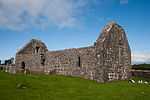 |
Carmelite Friars founded 1332 by a member of the de Burgos family; dissolved 1574; granted to Thomas Lewis 1574; restored c.1737 |
Crevaghbane Crevebane; Craghbane; Brenaghbane; Kribaghbane | 53°29′28″N 8°46′37″W / 53.491007°N 8.777046°W (approx) |
| Currabeg Monastery | monastic site, order, foundation and period unknown | |||
| Donaghpatrick Monastery | early monastic site, founded by St Patrick | Domnach-patraic; Magna Saeoli | 53°28′44″N 9°02′18″W / 53.478788°N 9.038208°W (?) | |
| Drumacoo Monastery | early monastic site | Druim-muccado; Droma-Mucada | 53°11′55″N 8°54′17″W / 53.198661°N 8.904676°W | |
| Dunmore Monastery | misidentification of Donaghpatrick[notes 11] | |||
| Dunmore Priory | 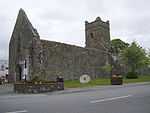 |
early monastic site Augustinian Friars founded c.1423 (before 1425) by Walter Mor de Bermingham, 9th Baron Athenry; dissolved 1569, friars remained in occupancy; held by John Burke fitz Thomas 1574; friars left in 1645, taking refuge at Mayfield |
Donmore Mac Oryshe; Downemore; Dominensis? | 53°37′13″N 8°44′31″W / 53.620412°N 8.742022°W |
| Eglish Friary | 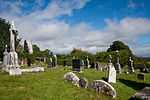 |
Carmelite friars founded 1393–1398; possibly abandoned during the reign of Elizabeth; possibly Franciscan Friars dissolved 1579 |
Monteceancohe; Sleushancough; Slewshancogh | 53°23′03″N 8°17′45″W / 53.384147°N 8.295708°W (approx) |
| Esker Friary | Dominican Friars — Regular Observance founded after 1622, site granted by Ulrick Burke, Earl of Clanricarde, at the request of the Provincial, Fr Ross Mageoghegan and other friars; friars left 1860s |
Brosk; Coilascail | [7] | |
| Esker Monastery | Redemptorists | [7] 53°16′56″N 8°40′55″W / 53.282215°N 8.681930°W | ||
| Fallig Friary ≈~ | Franciscan Friars - probable confusion for Killeigh (Fallig), County Offaly[notes 12] | Faghy; Fahy | ||
| Galway Augustinian Friary | Augustinian Friars founded 1500 by Margaret Athy, at the request of Richard Nagle; dissolved before 1578; leased to the town 1578; demolished 1652 in order to use the strategic position of the site |
53°16′17″N 9°02′49″W / 53.271320°N 9.047075°W | ||
| Galway Augustinian Friary *, later site | Augustinian Friars; church opened 4 September 1859; extant |
[8] 53°16′19″N 9°03′08″W / 53.272053°N 9.052101°W | ||
| Galway Carmelite Priory | Carmelite Friars founded c.1332? possibly by a member of the de Burgo family; dissolved after 1648 |
|||
| Galway Dominican Nunnery, first site | Dominican nuns founded 1644 in Augustine Street; exiled by the Cromwellians 1652; returned in 1686 to a house in Kirwan's Lane (see below) |
53°16′19″N 9°03′08″W / 53.271816°N 9.052252°W | ||
| Galway Dominican Nunnery, second site | Dominican nuns founded 1686 in Kirwan's Lane; expelled on a number of occasions 1691 convent, known as The Slate House, in use as barracks for British soldiers; fell into disrepair; destroyed by fire 1842 |
53°16′17″N 9°03′17″W / 53.271424°N 9.054644°W | ||
| Galway Dominican Nunnery *, current site | Dominican nuns founded March 1845 on Taylors Hill, country house known as 'Mount Eaton' or 'Seaview', previously owned by the Sloper family; extant |
[9] 53°16′05″N 9°04′43″W / 53.268165°N 9.078548°W | ||
| Galway Franciscan Friary * | Franciscan Friars built 1660; re-built 1781; extant |
[10] 53°16′34″N 9°03′17″W / 53.2759794°N 9.054746°W | ||
| Galway Franciscan Nunnery | Franciscan nuns, (?)Third Order founded 1511, church of St Nicholas purportedly granted by Walter Lynch to his daughter; dissolved during the reign of Elizabeth I |
St Nicholas; ____________________ The house of the poor nuns of St Francis | ||
| Galway Friary | Franciscan Friars Minor, Conventual founded 1296 by William de Burgo; Observant Franciscan Friars reformed 1460, and again before 1520; Conventuals and Observants apparently continued together, the latter in the minority; Conventuals attempted to evict Observants 1533 but were overruled; dissolved 1550; reoccupied during the reign of Queen Mary; leased to the mayor and townsmen c.1569, renewed 1578; community apparently extant until 1583 when the friars left and church burnt; returned 1612 and rebuilt the church; destroyed 1657; converted into a court house; current court house on site |
[11] 53°16′31″N 9°03′15″W / 53.275280°N 9.054121°W | ||
| Galway Priory | possibly formerly a hospital administered by the Premonstratensians Premonstratensian Canons daughter of Tuam; founded 1235, church purportedly granted to Tuam by the O'Halleran family; dissolved before 1451: relegated to chapel; left empty for a significant period by 1480; Dominican Friars founded 1488, granted license by Innocent III; dissolved 1570; granted to the town corporation; possibly a vicariate of Athenry, raised to priory status 1612; dissolved 1651 |
Blessed Virgin Mary extra Muros; St Mary on the Hill | 53°16′06″N 9°03′23″W / 53.268248°N 9.056527°W | |
| Gortnabishaun Monastery, Kilconla parish |
early monastic site | 53°32′32″N 9°01′36″W / 53.542348°N 9.026642°W | ||
| Gorumna Island, Killanin parish |
early monastic site, "abbey"[notes 13] | Gailimh; Galvia; Ngaillim; Bun-Gaillmhs; Bongal | [12] 53°14′09″N 9°41′56″W / 53.235864°N 9.698954°W | |
| Grange | Cistercian monks grange of Boyle |
Grainsearchmhaonmhai; Grange of Mowyny | ||
| High Island Monastery | early monastic site, founded before 665 by St Fechin | Ardoilen; Cellgradhaandomhain | 53°32′39″N 10°15′44″W / 53.544133°N 10.262089°W | |
| Illaunmore Monastery | Historical county location. See List of monastic houses in County Clare | |||
| Inchiquin Monastery | early monastic site, founded before 626 by St Brendan the Navigator | Inis-mac-ui-chuind; Insi-ui-chuinn; Inisquin | 53°27′48″N 9°14′16″W / 53.463340°N 9.237860°W | |
| Inishark Monastery | early monastic site | Inisairc | 53°36′22″N 10°16′04″W / 53.606002°N 10.267668°W | |
| Inishbofin Monastery | early monastic site, Gaelic monks founded 7th century by St Coleman supposed Benedictine monks — evidence lacking; suggested Augustinian Canons Regular during the reign of Henry VIII — evidence lacking |
Inis-bofine; Bophin Island | 53°36′56″N 10°11′20″W / 53.6154609°N 10.1887572°W | |
| Inisheer Monastery Aran Islands |
early monastic site | Ada-airthir; Ara-coemhain; Airdne-coimhain; Ardcoenmain? | 53°03′35″N 9°32′11″W / 53.059800°N 9.536519°W | |
| Inishlackan Friary | purported Franciscan Friars[notes 14] | |||
| Inishmaan Monastery Aran Islands |
early monastic site, two churches under the parish of St Enda, Inishmore | Inismedhon; Middle Island | 53°04′52″N 9°35′42″W / 53.081169°N 9.595077°W | |
| Inishmicatreer Monastery | early monastic site; "Abbey in ruins"[notes 15] |
'Inishmicatreer Abbey' ; Inish-mictreer | 53°29′57″N 9°15′01″W / 53.499266°N 9.250311°W | |
| Inishmore Monastery Aran Islands |
early monastic site, purportedly granted to St Enda, aided by St Ailbe of Emly, by Oengus, King of Munster Franciscan Friars, Third Order Regular[notes 16] or First Order[notes 17] founded after 1484, founder unknown;[notes 18] First Order possibly transferred to the Third Order after 1560; dissolved ? (during the reign of Elizabeth I?), abandoned during the religious persecution |
Ara-na-naemh; Ara-Enda; Killenda; Na Seacht dTeampaill; (The Seven Churches) | 53°07′19″N 9°40′07″W / 53.121989°N 9.668747°W | |
| Inishnee Monastery | early monastic site, founded before 768 | Inis-eidnigh? | 53°23′34″N 9°54′06″W / 53.392798°N 9.901600°W | |
| Kilbennan Monastery | 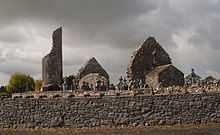 |
early monastic site, Gaelic monks founded by St Benignus (Benen), a disciple of St Patrick |
Cell-beneoin; Dun Lughaid | 53°32′19″N 8°53′31″W / 53.538749°N 8.892001°W |
| Kilboght Friary | Franciscan Friars, Third Order Regular founded before 1507 by Hugo de Wall; dissolved after 1564; granted to Richard, Earl of Clanricarde |
Kil-bought; kil-bout | ||
| Kilcolgan Monastery, Kilmacduagh diocese |
early monastic site, founded before c.580; erenagh until at least 1132; burned during war 1258 |
|||
| Kilcolgan Monastery, Clonfert diocese? |
early monastic site, founded 6th century by St Colmcille for Colgan (possibly same as immediately above) | Cell-colgain | ||
| Kilcommedan Monastery | early monastic site | Cell-comadan | 53°17′19″N 8°19′01″W / 53.288616°N 8.317080°W
(approx) | |
| Kilconla Monastery | early monastic site, founded reputedly by St Conlat | Cell-connla; Kilconly | 53°35′21″N 8°59′53″W / 53.589162°N 8.998135°W | |
| Kilconnell Friary |  |
Franciscan Friars founded 1414 (1353 or c.1353) by William O'Kelly, Lord of Ui Maine; dissolved 1541; on the site of an earlier monastery (see immediately below); (NM) |
Cell-chonaill; Kilconail | [13] 53°19′58″N 8°24′03″W / 53.332705°N 8.400807°W |
| Kilconnell Monastery | early monastic site, founded 6th century by St Conall | |||
| Kilcoona Monastery | early monastic site, founded by St Colmcille, site granted by Tibrades, son of Prince Maelduin, built by St Cuanna (Cuannach) | Cellcuannathe; Kilcoonagh | 53°26′35″N 9°01′59″W / 53.443021°N 9.033160°W | |
| Kilcorban Friary | Dominican Friars dependent on Athenry; founded 1446; dissolved during the reign of Elizabeth I(?); site now occupied by St Corban's Church |
Kilcarbain | 53°07′31″N 8°18′22″W / 53.125176°N 8.306072°W | |
| Kilcreevanty Abbey | 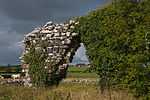 |
Benedictine nuns founded c.1200, chapel granted by Thomas de Burgo; Augustinian nuns — Arroasian refounded 1223; dissolved 1543 |
The Holy Rosary; The Blessed Virgin of the Holy Rosary ____________________ Cell-craobhnat; Kil-creunata; Kil-crevet; Casta Silva; Chaste Wood | 53°33′48″N 8°54′14″W / 53.563267°N 8.903778°W |
| Kilcummin Monastery ~ | early monastic site, founded by St Coeman | Kill-choemain; Cell-coemain | 53°14′26″N 9°45′31″W / 53.240564°N 9.758606°W (vaguely) | |
| Kilkilvery Monastery | early monastic site; erenaghs until at least 11th century; later passed to the Fratres Cruciferi of Castledermot |
Cell-cillbile | 53°28′27″N 9°06′26″W / 53.474255°N 9.107323°W (approx) | |
| Killamanagh Priory | early monastic site; Premonstratensian Canons daughter of Annaghdown; founded 1260 by an abbot of St John de Cella Parva, Annaghdown; dissolved c.1542?, probably suppressed |
St Mary de Cella Parva Cellnamanagh; Kilnamanoch; Killinimanach; Cella Parva St Mary Cell-coemain | 53°30′05″N 9°03′04″W / 53.501420°N 9.051055°W | |
| Killeely Monastery | early monastic site | 53°12′33″N 8°51′25″W / 53.209242°N 8.857003°W (approx) | ||
| Killeenmunterlane Monastery | early monastic site | 53°11′54″N 8°53′14″W / 53.198436°N 8.887146°W (approx) | ||
| Killower Monastery | early monastic site; erenaghs 11th century |
Killawyr | 53°30′47″N 8°57′14″W / 53.513062°N 8.953900°W | |
| Killursa Monastery | early monastic site, founded by St Fursa (Fursey); eranaghs at least to 11th century; church passed to the Fratres Cruciferi of Castledermot |
Cell-fursa; Rathmat; Rathmath; Rathmuighe | 53°28′04″N 9°08′42″W / 53.467747°N 9.144884°W | |
| Kilmacduagh Monastery |  |
early monastic site, founded 6th-7th century by St Colman son of Duagh on land granted by Guaire, King ruined by William Fitz Adelm de Burgo early 13th century; episcopal diocesan cathedral 11th century; Augustinian Canons Regular founded 1225-50; dissolved 1584; granted to Richard, Earl of Clanricarde |
St Mary de Petra ____________________ Cell-mic-duaich; Duaca; Kil-macough | 53°02′53″N 8°53′17″W / 53.0480262°N 8.8880253°W |
| Kilmeen Monastery | early monastic site | Cell-mian | 53°12′19″N 8°29′51″W / 53.205261°N 8.497496°W | |
| Kilmurry Friary | Franciscan Friars given as Dominican Friars<ref group="notes" name="Kilmurry1>H. T. Knox, Notes on Early History of Dioceses of Tuam, Killala and Achonry, 1904, p.296</ref> |
Cell-mhuire; Kilmurray | 53°34′09″N 8°41′22″W / 53.569065°N 8.689531°W | |
| Kilreekill Monastery | early monastic site, nuns reputedly founded by St Patrick for his sister Richella |
Cell-richill | 53°13′49″N 8°27′13″W / 53.230290°N 8.453722°W | |
| Kiltiernan Monastery | early monastic site | Cell-tighernain | 53°11′17″N 8°50′33″W / 53.188023°N 8.842610°W | |
| Kiltullagh Monastery | early monastic site; possibly not continuing after 10th century |
Cell-tulach-mhaonmhai | 53°18′47″N 8°57′18″W / 53.313083°N 8.955059°W (approx) | |
| Kinalehin Friary, nr Abbey |
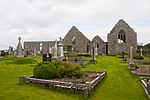 |
Carthusian monks — possibly from Hinton founded c.1252 by John de Cogan I; purportedly destroyed 1279 and if so, rebuilt soon after; sold to the Hospital of St John of Jerusalem 1306 - the Knights appear to have held appurtenances, though the sale appears never to have completed; dissolved by General Chapter the Grande Chartreuse 1321; abandoned by the monks c.1341; Franciscan Friars Minor, Conventual refounded c.1371 by the de Burgos, granted by the Pope; destroyed after the general suppression; purchased from Elizabeth I by Richard de Burgo (Rufus), Earl of Clanricarde, who retained it for the friars dissolved before 1609; Observant Franciscan Friars refounded 1611; dissolved after 1642; friars probably expelled under the Cromwellians; returned during the reign of Charles II |
Abbey; Kilnalahan; Kinaleghin; Kenaloyn; Cenel-Feichin; Cineoil-Feichin; Kilnalekin; Kinelfeichin | [14] 53°06′10″N 8°23′39″W / 53.1026822°N 8.3940697°W |
| Kinvarra Monastery | early monastic site, patron St Coman | Ceamm-mhara; Cenn-mara | 53°08′21″N 8°56′13″W / 53.139305°N 8.936992°W | |
| Knockmoy Abbey |  |
Cistercian monks — from Boyle founded 1190 by Cathal Crobderg O'Conor, King of Connacht; dissolved 1542, surrendered by Abbot Hugh O'Kelly 24 May 1542, though a secularised form of monasticism apparently continued; let to Andrew Brereton for 21 years, 1566; part granted to Nicholas FitzSymons 1568; QE |
Abbeyknockmoy Abbey; Collis Victoriae; Cnoc-muaidhe; Knockmuighe; Mainister-cnoc-muaide | 53°26′26″N 8°44′33″W / 53.440519°N 8.742571°W |
| Kylemore Abbey |  |
Benedictine monks mansion now serves as convent boarding school |
53°33′42″N 9°53′22″W / 53.561724°N 9.889439°W | |
| Lissonuffy Cell | Historical county location. See List of monastic houses in County Roscommon | |||
| Loughrea Priory | 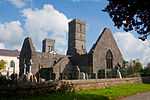 |
Carmelite Friars founded c.1300 by Richard de Burgo, Earl of Ulster; dissolved before 1541; granted to Richard, Earl of Clanricarde 1652; friars permitted to remain; Teresian (Discalced) Carmelites occupied intermittently from 1640 |
St Mary ____________________ Loch-riach; Laughreagh; Lough-Reogh; Balliloc riagh | 53°11′56″N 8°34′08″W / 53.199°N 8.569°W |
| Loughrea Abbey * | Discalced Carmelite Friars founded 19th century; extant |
53°12′01″N 8°34′13″W / 53.200405°N 8.570168°W | ||
| Maghee Monastery ~ | early monastic site, possibly County Galway, location unidentified | Mag-Cé; Magele; Magelle; Magtriudi | location unknown | |
| Mayfield | Augustinian Friars refuge from Dunmore 1645 | |||
| Meelick Friary + | 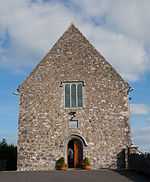 |
Franciscan Friars Minor, Conventual founded 1414, mandate to license a Franciscan foundation issued to the Bishop of Clonfert by the Pope; Observant Franciscan Friars refounded 1479; dissolved 1559, suppressed and ruined; restored 1595; dissolved after 1595; granted to the Earl of Clanricarde; church and buildings largely destroyed by c.1616; Observant Franciscan Friars 1680, intermittently until 1852; now R.C. church |
Mil-eagh; Miliuc; Milick; Mykescin | 53°10′25″N 8°05′08″W / 53.173600°N 8.085498°W |
| Monasternalea Monastery | early monastic site erroneously purportedly Franciscan Friars,[notes 19] — reliable evidence lacking |
Abbey Grey Monastery; Abbeygrey Monastery; Mainistir na Liath; Kilmore-ne-togher? | 53°33′29″N 8°21′56″W / 53.5580536°N 8.3655739°W | |
| Moor Abbey, parish of Athenry |
Cistiercian monks? possibly chapel of Moor Aughrim at a grange of Knockmoy |
|||
| Omey Monastery | early monastic site, founded 7th century by St Fechin of Fore with the aid of King Guare; ruins excavated and re-sited by archaeologists in 1990s |
Iomaidh; Immagh; Temple-feheen | 53°32′08″N 10°10′31″W / 53.535506°N 10.175411°W (ruins re-sited at 53°32′02″N 10°09′26″W / 53.533906°N 10.157118°W) | |
| Portumna Friary | 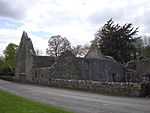 |
Dominican monks founded before 1414 by Murchad? O'Madden, Lord, on the site of the Cistercian monks' priory (see immediately below); dissolved c.1582; granted to the Earls of Clanricarde 1582; part used as C.I. church 1631; choir became C.I. church 1762; Observant refounded before 1426 |
The Friary Church of the Blessed Virgin Mary, Portumna ____________________ Portumna Abbey | 53°05′10″N 8°13′03″W / 53.086075°N 8.217595°W |
| Portumna Priory | Cistercian monks chapel, dependent on Dunbrody; founded 1254; became disused; Dominican friary founded on site (see immediately above) |
The Priory Church of Saint Peter and Saint Paul, Portumna ____________________ Portumna Abbey; Portomna; Portompria | ||
| Rafwee Monastery | early monastic site, coarb 11th century | Raithbuidhe | 53°26′55″N 9°04′13″W / 53.448500°N 9.070330°W (approx) | |
| Rathmagh Monastery | early monastic site, founded 6th century by St Brendan of Clonfert | Raithmaige | 53°27′04″N 9°10′38″W / 53.451005°N 9.177361°W (approx) | |
| Roscam Monastery | early monastic site, founded before 779; destroyed by the Danes 807 |
Ros-chaim; Ros-camm | ||
| Ross Errilly Friary | 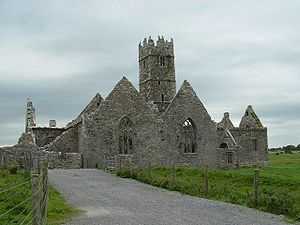 |
Franciscan Friars Minor, Conventual founded 1351 (1431) by Raymond de Burgo; Observant Franciscan Friars reformed 1470 (1498) by the Grannard family (William, Lord Grannard?); dissolved 1562; granted to the Earl of Clanricarde by Elizabeth I 1562; friars afforded protection by Clanricarde friars left before 1580; re-established by Clanricarde 1580; expelled by Protestants and English soldiers 1580; occupied by English soldiers 1596; friars reinstated before 1601; abandoned by friars to escape imprisonment; reinstated 1611 by Clanricarde; expelled 1612; returned 1626 and 1641; abandoned 1656; reoccupied and repaired 1664; abandoned after 1688; returned 1712; possibly expelled 1731; returned 1753, restored by Lord St George; dissolved 1832; ruinous by 1835; (NM) |
Ross; Ross-erelly; Ross-eriall; Ros-traily; Ros-oirbealaigh; Ruisairbhealaigh; Iriala | 53°28′47″N 9°07′54″W / 53.479707°N 9.131543°W |
| Rosshill Monastery | early monastic site, reputedly founded by St Brendan of Clonfert; "'Abbey' site"[notes 20] |
Teampull Brandon | 53°33′15″N 9°22′07″W / 53.554185°N 9.368495°W | |
| Roundstone Monastery | Historical photo; Historical photo |
Franciscan Friars, Third Order Regular founded 1835; site redeveloped |
53°23′32″N 9°54′59″W / 53.392168°N 9.916368°W | |
| St Macdara's Island Monastery | early emeritical monastic site, founded by St (Sionnach) Mac Dara | Cruach Macdara; Cruanacara | [15] 53°18′12″N 9°55′05″W / 53.303390°N 9.918079°W | |
| Templemoyle-Kiltullagh Friary | Franciscan Friars, Third Order Regular founded after 1441; dissolved 1595; granted to Edmond Barrett |
Tombmoyle | 53°20′19″N 8°41′39″W / 53.338717°N 8.694088°W | |
| Tisaxon Friary | Franciscan Friars, Third Order Regular founded before 1442, mandate issued to the Bishop of Ballysadare by the Pope; dissolved 1574; granted to Thomas Lewes 5 April 1574 |
Teagh-saxon; Theascaston; Trachsasson cf. Templegal | 53°20′31″N 8°42′10″W / 53.342054°N 8.702792°W | |
| Toghergar Friary | purported Franciscan Friars — reliable evidence lacking | |||
| Toombeola Abbey | Dominican Friars dependent on Athenry; apparently founded after January 1427 by Chieftain O'Flaherty, when papal license obtained to build a monastery; dubiously suggested Augustinian Friars - Dominicans possibly gave shelter to friars of other orders in penal periods dissolved after 1558; seized by the Protestants reoccupied 18th century |
St Patrick ____________________ Tuaim-beola; Tom-beola; Tum-beola | 53°25′52″N 9°51′52″W / 53.431245°N 9.864462°W | |
| Tuam Monastery + |  |
early monastic site, founded 6th century by St Jarlath (Iarlath); episcopal diocesan cathedral 1111; extant |
53°30′55″N 8°50′51″W / 53.5153073°N 8.8473845°W | |
| Tuam Augustinian Abbey | Augustinian Canons Regular — Arroasian priory or hospital founded c.1140 by Turlogh O'Connor; raised to abbey status c.1360?; dissolved c.1562, c.1572; granted to Richard, Earl of Clanricarde; Augustinian Friars refounded |
St John the Evangelist ____________________ St John in the suburbs | ||
| Tuam Friary | Fratres Cruciferi founded 1140 by an O'Connor |
|||
| Tuam Nunnery | purported nuns or Premonstratensian Canonesses — evidence lacking; a tenement owned by the Arroasian nuns of Kilcrevanty existed in Tuam (Tuaym) 1223-4 |
|||
| Tuam Premonstratensian Abbey | Premonstratensian Canons daughter of Cockersand?; founded 1203-4?; revived from Prémontre? 1217-8?; burned with the town and other churches 1244; dissolved c.1574 |
The Holy Trinity ____________________ Tuaim-da-ghuallann; Tuaim-da-gualand; Tuaim-da-valuin | 53°30′52″N 8°51′11″W / 53.514440°N 8.853157°W | |
| Tuam Abbey of the Scrin ≈ | order, foundation and period unknown — listed 1574; the church of the Shrine apparently adjacent to the cathedral — possible reference to the vicars' college or Fratres Cruciferi | |||
Glossary
|
|
Map link to lists of monastic houses in Ireland by county
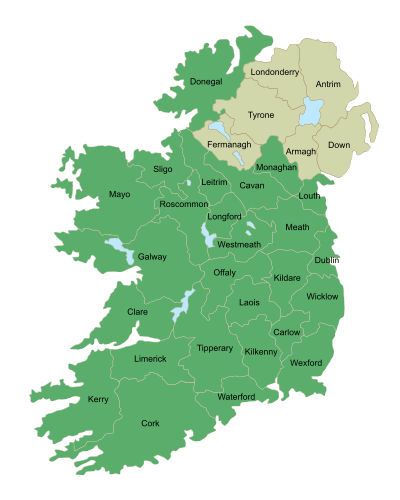
Click on a county to go to the corresponding article
|
Notes
- ↑ Ordnance Survey
- ↑ Louis Augustin Alemand, Monasticum Hibernicum, translated and edited by John Stevens, 1722, pp.280, 234-5, mistakes Nenagh/Aonagh (Annagh/Enach) for Annaghdown, error replicated by others
- ↑ Ordnance Survey
- ↑ Lord Killanin & M. V. Duignan, Shell Guide to Ireland 1962, new edition 1967
- ↑ Wadding
- ↑ Harris's Table, in Ware-Harris, Antiquitie, 1745
- ↑ Arch. Ord. Rome (Carmelite order), SM. II, C.O.. II. 26, p.13 (compiled 1739-59)
- ↑ Ordnance Survey ½ inch;
- ↑ Ordnance Survey 6 inch;
- ↑ Louis Augustin Alemand, Monasticum Hibernicum, translated and edited by John Stevens, 1722, p.281 and Mervyn Archdall, Monasticon Hibernicum, 1786, p.277
- ↑ Mervyn Archdall, Monasticon Hibernicum, 1786, p.231 mistakenly states Dunmore Friary was located on the site of an early monastery
- ↑ Mervyn Archdall, Monasticon Hibernicum, 1786, p.285 suggests Fallig (given as Observant Franciscans by Louis Augustin Alemand, Monasticum Hibernicum, translated and edited by John Stevens, 1722, p.289) is Faghy, County Galway
- ↑ Ordnance Survey
- ↑ Lord Killanin & M. V. Duignan, Shell Guide to Ireland, 1962 (1967 edition), p.414
- ↑ Ordnance Survey
- ↑ Analecta Hibernica (Irish Manuscript Commission) No.6, November 1934 (OFM), i, p.104
- ↑ Analecta Hibernica (Irish Manuscript Commission) No.6, November 1934 (OFM), i, p.27
- ↑ Analecta Hibernica (Irish Manuscript Commission) No.6, November 1934 (OFM), ii, p.161
- ↑ Canice Mooney, The Franciscans in Ireland, Terminus (Mar-Apr 1956), p.143;
- ↑ Ordnance Survey
References
- ↑ Topographical Dictionary of Ireland: Samuel Lewis, 1837: Abbeygormagan - From Ireland - Irish Ancestry, Genealogy & Family History
- ↑
- ↑ Ahascragh West (Castlegar) in county Galway
- ↑ A Topographical Dictionary of Great Britain and Ireland: Compiled from Local ... - John Gorton - Google Books
- ↑ List of abbeys, priories, nunneries, hospitals, and other religious ... - William Cobbett - Google Books
- ↑ Cloonfush in county Galway
- ↑ 7.0 7.1 Redemptorists Galway – Esker | A Redemptorist Ireland Website
- ↑ Augustinians In Galway | Our History
- ↑ Kennys Bookshop & Art Gallery - Old Galway with Tom Kenny - THE DOMINICAN NUNS AT TAYLORS HILL
- ↑
- ↑
- ↑ Connemara, Gorumna Island, in county Galway
- ↑ Kilconnell Friary, County Galway - National Monuments Service
- ↑ The Carthusians in Ireland
- ↑ St Macdara’s Island in county Galway
See also
| ||||||||||||||